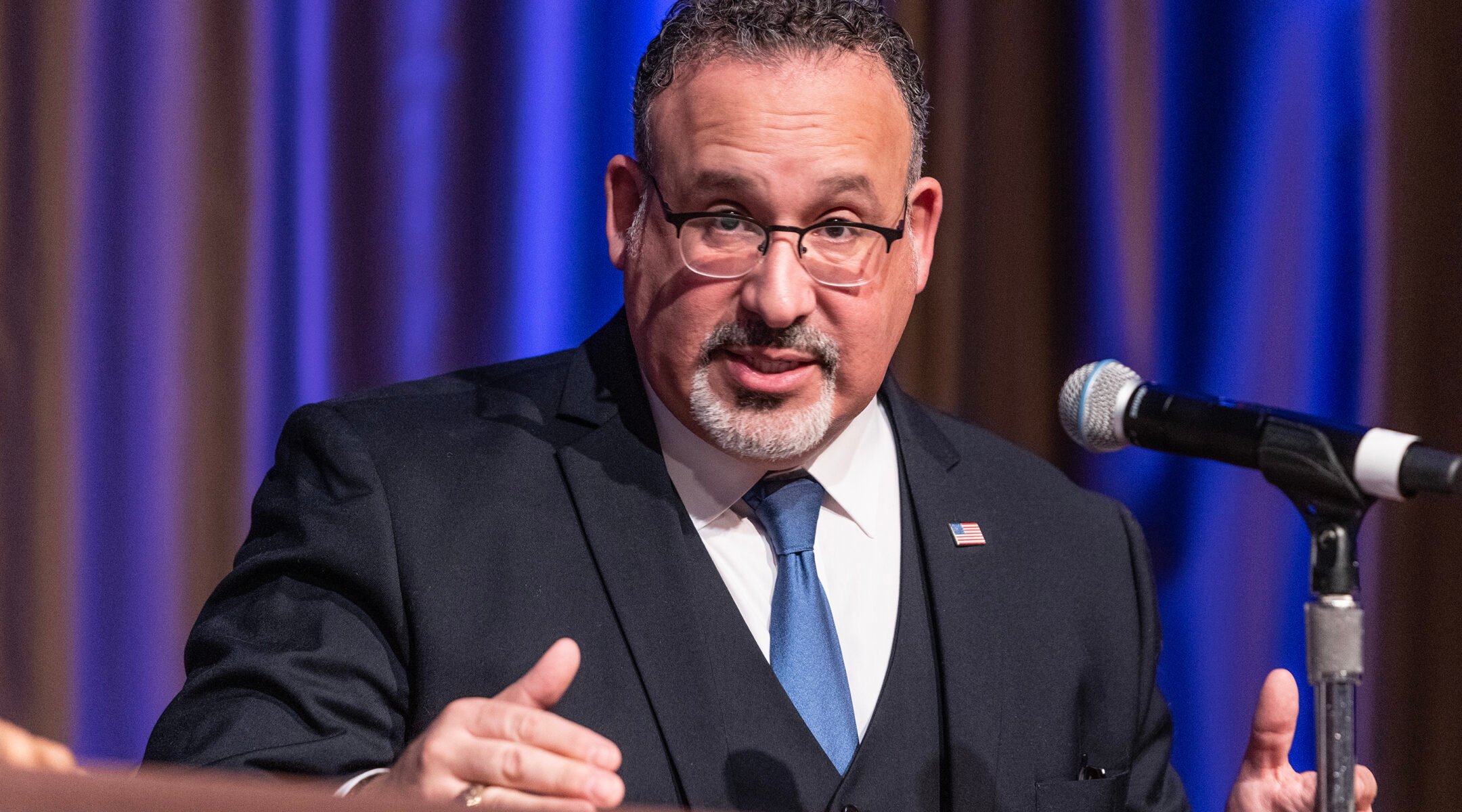WASHINGTON (JTA) — Education Secretary Miguel Cardona had a presentation ready on combating antisemitism in schools and universities — an issue that has been at the center of a burning debate in recent weeks over pro-Palestinian encampments at campuses nationwide.
But he had to present it twice, because at least five Jewish organizations boycotted the first meeting because they did not want to share the virtual room on Friday with progressive Jewish groups.
Representatives of the Jewish Federations of North America, the Anti-Defamation League, the Conference of Presidents of Major American Jewish Organizations, the Orthodox Union and the Brandeis Center for Human Rights Under Law dropped out of a Zoom meeting scheduled for 10 a.m. just minutes before its scheduled start.
Participants learned through texts that the Conference of Presidents was scrambling to get people to drop off the call because it had learned that several progressive groups were going to be on the call. Those groups included Bend the Arc, a social justice activist group; T’ruah, a rabbinic human rights group; Nexus, a group that offers resources and position papers on Israel and antisemitism; and the Diaspora Alliance, a group that combats antisemitism in conjunction with minority communities whose leaders have harshly criticized Israel’s actions.
“I was really surprised not to see them there,” Jamie Beran, the Bend the Arc CEO, said in an interview about the missing organizations. Noting that a number of centrist and conservative groups did agree to join the call, she added, “And I was grateful to be with groups that are taking the safety of students seriously and putting politics aside.”
Nathan Diament, the Orthodox Union’s Washington director, did not want to discuss on the record why he and other officials requested the second meeting, except to note that the meeting was initiated by the Orthodox Union and the Anti-Defamation League, and would not have happened otherwise. A letter to Cardona spearhead by the O.U. and the ADL said that while the groups appreciated Cardona’s comments condemning antisemitism on campuses, “they are not at all sufficient to address the crisis.”
“We asked for a meeting within a week and we’re very appreciative that they responded and made it happen within a week,” Diament told JTA. “And so we had the meeting that we asked for.”
Hillel International, the umbrella Jewish campus group, had signed onto the ADL letter and had also been scheduled to attend but did not, according to officials invited to the call, although it was not clear if Hillel was boycotting.
Cardona agreed to re-run the call at 1 p.m. for the groups that boycotted the first call. About 20 groups were represented on the first call.
Groups boycotting the first call declined to speak on the record to the Jewish Telegraphic Agency until the second call was completed. One of the officials from this group said the Conference of Presidents had arranged the call and was blindsided by the addition of the progressive groups.
“It’s not a usual thing for a coalition to ask for a meeting for the meeting to be granted and then it turns out a different group of people are also invited,” said the official, who asked not to be identified to speak frankly about a sensitive matter.
Another factor was that a number of the progressive groups oppose the enshrining into law of a popular and controversial definition of antisemitism, known by the shorthand IHRA, which they see as too focused on criticism of Israel.
Nexus advances a different definition that gives a wider berth to criticism of Israel.
“There would be more groups which meant that each group would have less time to speak and that it would have less of the feel of a real meeting, as opposed to the government just says what it’s saying and we get very little opportunity to talk,” said the official from one of the boycotting groups. “Plus, there was a concern that there would be less uniformity among the groups because of the nature of the other groups who were getting on.”
The Department of Education did not return requests for comment.
Some officials of the groups that did participate — including groups that have good relationships with the boycotting groups — were stunned at their absence for what they regarded as a minor objection. They noted that groups that would be perceived as conservative, including the Orthodox Agudath Israel of America, and centrist, such as the American Jewish Committee, were in attendance. “It was not even left vs. right, it was just a small group of organizations that decided not to show up,” a participant said.
Also attending were liberal-leaning groups that work with the mainstream, such as the Reform movement, the Conservative movement, and the Jewish Council for Public Affairs. J Street, the liberal Jewish Middle East policy group, was represented by its student affiliate, J Street U.
The AJC’s CEO, Ted Deutch delivered opening remarks on behalf of the Jewish groups. Julie Fishman Rayman, the AJC managing director of policy and political affairs, said the meeting, which also included Neera Tanden, Biden’s domestic policy adviser, was productive. “The Secretary and the White House Domestic Policy Advisor acknowledged the fear and anxiety Jews are feeling at this moment and expressed eagerness to address them and the need to do more,” she said in an email.
The scramble by the Conference of Presidents to get people off the meeting was so last-minute that Kenneth Marcus, the chairman of the Brandeis Center, logged on for a minute, then wrote “I have to leave” in the chat, and logged off, according to two participants.
Cardona launched the meeting by noting the diversity of views on the call. The thrust of the appeal from department staffers was that its Office of Civil Rights was overwhelmed with requests to investigate civil rights violations at schools and universities, including antisemitism charges, among others.
The department had previously emphasized that complaints to the office were a welcome response to allegations of antisemitism on college campuses. An onslaught of complaints has ensued, many filed by Jewish groups and advocates, including the Brandeis Center.
Staffers are handling 50 cases at a time, said Catherine Lhamon, the assistant secretary who runs the Office of Civil Rights, and that it takes months to handle each case.
“Anyone who cares about Jewish safety on campus needs to support more resources for OCR to actually get through the backlog of Title VI investigations, which is the core tool we have to protecting the civil rights of Jewish students and all students on campus,” Amy Spitalnick, the JCPA CEO, said in an interview.
Kevin Rachlin, the Washington director of Nexus, said the Republicans in Congress now pledging to massively increase oversight of universities as a means of protecting Jewish students also were calling for cuts of up to 25% of the funding for the Office of Civil Rights. “They clearly don’t like OCR, and if they really wanted to combat antisemitism on campuses right now, they will increase this funding,” he said.
Also raised was the need to balance free speech on campuses with the rights of Jewish students, some of whom have complained of being targeted and harassed by pro-Palestinian protesters, Beran said.
“The groups were really measured, saying that they need to protect free speech and students need to be protected from harassment,” she said of participants on the call.
Hours before the call, Cardona sent out a Dear Colleague letter to university presidents decrying reports of antisemitic harassment on campuses. “I am particularly disturbed by the sharp rise in antisemitism targeting Jewish students on some college campuses,” he said.
Diament said that on the second call, Cardona and others raised funding for OCR, which the groups appreciated. Diament said the groups pressed the department to provide greater clarity to universities on what constitutes antisemitism.
Only one group, the National Council of Jewish Women, was represented on both calls.
JTA has documented Jewish history in real-time for over a century. Keep our journalism strong by joining us in supporting independent, award-winning reporting.






